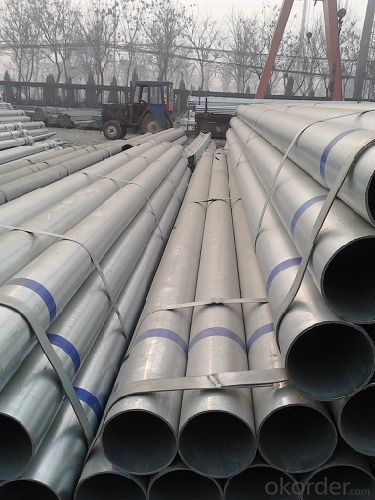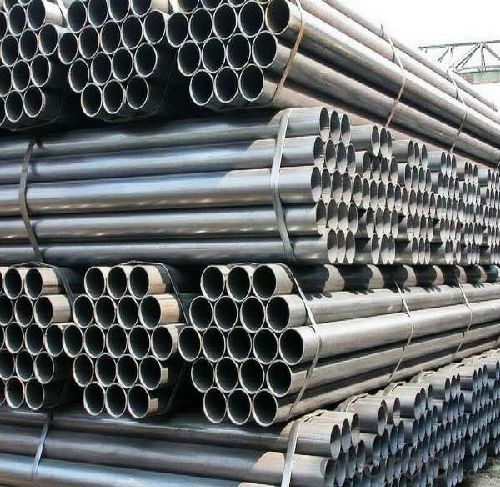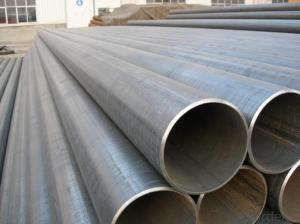API 5L GR.B X52 ERW PIPE
- Loading Port:
- China Main Port
- Payment Terms:
- TT or LC
- Min Order Qty:
- -
- Supply Capability:
- -
OKorder Service Pledge
OKorder Financial Service
You Might Also Like
1、Structure of Welded Steel Tube:
Welded Steel Tube is produced by drawing a solid billet over a piercing rod to create the hollow shell. We will provide you high quality of welded pipe and professioanl service.
2、Main Features of the Welded Steel Tube:
• High manufacturing accuracy
• The higher strength
• The small inertia resistance
• Strong heat dissipation ability
• Good visual effect
• Satisfy price
3、Welded Steel Tube Specification:
Standard | GB, DIN, ASTM ASTM A106-2006, ASTM A53-2007 |
Grade | 10#-45#, 16Mn 10#, 20#, 45#, 16Mn |
Thickness | 8 - 33 mm |
Section Shape | Round |
Outer Diameter | 133 - 219 mm |
Place of Origin | Shandong, China (Mainland) |
Secondary Or Not | Non-secondary |
Application | Hydraulic Pipe |
Technique | Cold Drawn |
Certification | API |
Surface Treatment | factory state or painted black |
Special Pipe | API Pipe |
Alloy Or Not | Non-alloy |
Length | 5-12M |
Outer Diameter | 21.3-610mm |
Grade | 20#, 45#, Q345, API J55, API K55, API L80, API N80, API P110, A53B |
Standard | ASME, ASTM |
1) Material:20#(ASTM A 106/A53 GRB.API5LGRB,GB),45#,16Mn,10#.
2) Specification range:OD:21.3-610mm,WT:6-70mm,length:6-12m or according to the requirement of clients.
3) Excutive standards:GB,ASME API5L.ASTM A 106/A53,Despite of the above standards,we can also supply seamless steel pipe with standard of DIN,JIS,and so on,and also develop new products according to the requirements of our clients!
4) Surface:black lacquered,varnish coating or galvanized.
5) Ends:Beveled or square cut,plastic capped,painted.
6) Packing:bundles wrapped with strong steel strip,seaworthy packing.
4、Packaging & Delivery
Packaging Details: | seaworthy package,bundles wrapped with strong steel strip |
Delivery Detail: | 15-30days after received 30%TT |
5、FAQ of Welded Steel Tube:
①How is the quality of your products?
Our products are strictly in accordance with international and domestic standard. We test on every pipe before delivery. Any quality certification or testing report you want to see, please tell us.
Guaranteed: If products’ quality is not in accordance with description as we provide or the promise before you place order, we promise 100% refund.
②How about the price?
We want to save your time and be absolutely honest with our business relationship, so we quote as low as possible for every client. Besides, discount can be given according to the quantity. if you dissatisfy with our factory price, just don’t waste your time. Our quotation is professional and reasonable.
③Why should you choose us?
Choice happens because of our quality and price. Additionally, we can also offer professional products inquiry, products knowledge train (for agents), fast goods delivery, outstanding customer solution proposals. Our service formula: good quality + good price + good service=customer’s trust.
SGS test is available. Customer inspection before shipping is welcome. Third party inspection is OK.
6、 Welded Steel Tube Images:


- Q:Are steel pipes suitable for underground cable protection?
- Yes, steel pipes are suitable for underground cable protection. Steel pipes provide excellent durability and strength, making them ideal for protecting cables from external factors such as physical damage, moisture, and corrosion. They are able to withstand the weight of the soil and any potential pressure from above, ensuring the cables remain secure and protected. Additionally, steel pipes can be easily welded or connected to create a continuous and seamless conduit, further enhancing their effectiveness in underground cable protection.
- Q:What is the difference between steel pipe and fiberglass pipe?
- Steel pipe and fiberglass pipe differ in terms of material composition, durability, flexibility, and cost. Steel pipe is made of steel, which provides strength and resilience, making it ideal for high-pressure applications and underground installations. Fiberglass pipe, on the other hand, is composed of reinforced plastic fibers, resulting in a lightweight and corrosion-resistant material suitable for above-ground and corrosive environments. While steel pipe offers higher tensile strength, fiberglass pipe excels in its flexibility, allowing for easier installation and reduced maintenance. Additionally, steel pipe is typically more expensive due to the cost of materials and manufacturing processes, while fiberglass pipe is more cost-effective in terms of initial installation and long-term maintenance.
- Q:Can steel pipes be galvanized?
- Indeed, it is possible to galvanize steel pipes. Galvanization involves the application of a safeguarding zinc layer to steel or iron in order to hinder corrosion. The steel pipes are immersed in a solution of molten zinc, resulting in a chemical union between the zinc and steel that produces a protective coating resistant to corrosion. Galvanization finds widespread use across multiple fields, including plumbing, construction, and outdoor structures, primarily to prolong the durability of steel pipes and inhibit rust formation.
- Q:What material is RHS in the steel tube?
- SHS stands for thin-walled square steel tubes in the structure and represents the self ignition ceramic composite steel tube in the material
- Q:What are the different methods of inspecting steel pipes?
- There are several methods of inspecting steel pipes, including visual inspection, non-destructive testing (such as ultrasonic testing, magnetic particle testing, and dye penetrant testing), radiographic testing, and eddy current testing. These methods help identify any defects, such as cracks, corrosion, or wall thickness variations, ensuring the quality and integrity of the steel pipes.
- Q:Water, gas, steel pipes, thick steel wire means?
- Often used in water, heating, gas, compressed air and vacuum lines. Can be used in pressure gauge pressure of 0.6 MPa (6 atm) steam pipe and condensate pipeline below, can also be used for conveying non erosive and non flammable and explosive media. Is divided into ordinary (working pressure is 1 MPa pressure gauge, 10) and strengthening (working pressure gauge is 1.6 MPa, 16 ATM) two. Galvanized white iron tube (galvanized iron tube). Non galvanized black iron pipe (black pipe).
- Q:How are steel pipes used in the telecommunications sector?
- Various purposes in the telecommunications sector commonly make use of steel pipes. Conduit for underground cable installations is the first purpose served by steel pipes. These pipes ensure the safety of fiber optic cables, which carry data and voice signals over long distances, by providing protection and support. The sturdy nature of steel pipes guarantees that the cables remain secure from external factors like moisture, rodents, and accidental damage. Furthermore, the construction of telecommunication towers and masts involves the use of steel pipes. A strong and durable material is required to bear the weight of antennas, transmitters, and other equipment in these structures. For this purpose, steel pipes are ideal due to their high tensile strength and resistance to harsh weather conditions. Additionally, steel pipes are utilized in the installation of overhead communication lines. These lines are often suspended between poles or towers, and steel pipes serve as supports or brackets to hold the cables in place. The corrosion-resistant properties of steel make it a reliable choice for outdoor installations exposed to various elements. In conclusion, steel pipes play a critical role in the telecommunications sector. They provide protection, support, and durability to cable installations, tower constructions, and overhead communication lines. Their strength and resistance to environmental factors make them an essential component in the establishment and maintenance of reliable telecommunications networks.
- Q:Can steel pipes be used for water supply systems?
- Yes, steel pipes can be used for water supply systems. Steel pipes are commonly used in water distribution systems due to their strength, durability, and resistance to corrosion. However, it is important to ensure that the steel pipes are properly coated or lined to prevent rusting and contamination of the water supply. Regular maintenance and inspection are also crucial to ensure the longevity and safety of steel pipes in water supply systems.
- Q:What are the different methods of pipe welding for steel pipes?
- Steel pipes can be welded using various methods, each with its own advantages and applications. Here are some commonly used techniques: 1. Stick welding, also called Shielded Metal Arc Welding (SMAW), involves manually melting a consumable electrode coated in flux. The flux creates a protective shield around the weld pool. SMAW is versatile and can be used in different positions, making it suitable for both field and workshop applications. 2. Gas Metal Arc Welding (GMAW), also known as MIG welding, uses a continuous wire electrode fed through a welding gun. The gun supplies a shielding gas, such as argon or a mixture of argon and carbon dioxide, to protect the weld pool from contamination. GMAW is known for its high welding speed and is commonly used in industrial settings. 3. Flux-Cored Arc Welding (FCAW) is similar to GMAW, but the wire electrode is filled with flux instead of relying on an external gas. The flux creates a protective shield around the weld pool, eliminating the need for a separate gas supply. FCAW is often used in outdoor and windy conditions for better protection against contamination. 4. Gas Tungsten Arc Welding (GTAW), also called TIG welding, uses a non-consumable tungsten electrode to create the weld. A separate shielding gas, typically argon, is used to protect the weld pool. GTAW produces high-quality welds with excellent control, making it suitable for precision applications. 5. Submerged Arc Welding (SAW) is an automated process that uses a continuously fed wire electrode and a granular flux poured over the weld joint. The arc is submerged beneath the flux, providing excellent protection against contamination. SAW is commonly used in heavy fabrication and pipeline industries due to its high deposition rates and deep penetration capabilities. These are just a few of the methods available for welding steel pipes. The choice of method depends on factors such as the application, material thickness, desired weld quality, and available equipment. Selecting the appropriate method is crucial to ensure strong and reliable welds in steel pipe applications.
- Q:How are steel pipes used in the construction industry?
- Steel pipes are extensively used in the construction industry for a wide range of applications. They are primarily used for transporting various fluids and gases, such as water, oil, and natural gas, throughout the construction site or building. Steel pipes are also commonly used as structural elements in the construction of buildings, bridges, and tunnels, providing strength and stability to the structures. Additionally, steel pipes are utilized in the construction of plumbing systems, HVAC (heating, ventilation, and air conditioning) systems, and fire protection systems.
1. Manufacturer Overview |
|
|---|---|
| Location | |
| Year Established | |
| Annual Output Value | |
| Main Markets | |
| Company Certifications | |
2. Manufacturer Certificates |
|
|---|---|
| a) Certification Name | |
| Range | |
| Reference | |
| Validity Period | |
3. Manufacturer Capability |
|
|---|---|
| a)Trade Capacity | |
| Nearest Port | |
| Export Percentage | |
| No.of Employees in Trade Department | |
| Language Spoken: | |
| b)Factory Information | |
| Factory Size: | |
| No. of Production Lines | |
| Contract Manufacturing | |
| Product Price Range | |
Send your message to us
API 5L GR.B X52 ERW PIPE
- Loading Port:
- China Main Port
- Payment Terms:
- TT or LC
- Min Order Qty:
- -
- Supply Capability:
- -
OKorder Service Pledge
OKorder Financial Service
Similar products
New products
Hot products
Related keywords






























